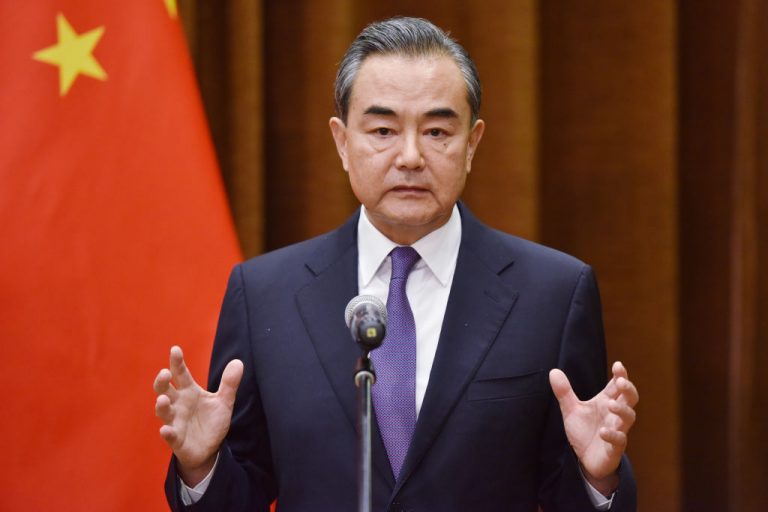China’s Foreign Minister Wang Yi spoke with his Ukrainian counterpart, Dmytro Kuleba, in a phone call on April 4, as reported by Reuters.
The meeting, which Beijing said was made at Ukraine’s request, was the first high-level conversation between the two nations since March 1, and reportedly saw Beijing supporting peace talks to end the conflict in Ukraine. According to the Ukrainian foreign ministry, Kuleba had asked Beijing in March to use its ties with Moscow to stop Russia’s invasion.
“Wars end eventually. The key is how to reflect on the pain, to maintain lasting security in Europe and establish a balanced, effective and sustainable European security mechanism,” China’s foreign ministry quoted Wang as saying.
“China stands ready to play a constructive role in this regard in an objective position.”
Following the call, Kuleba tweeted: “Grateful to my Chinese counterpart for solidarity with civilian victims.”
Success
You are now signed up for our newsletter
Success
Check your email to complete sign up
“We both share the conviction that ending the war against Ukraine serves common interests of peace, global food security and international trade,” he said.
Beijing’s stance
The People’s Republic of China (PRC) has insisted on its neutrality regarding Russia’s war on Ukraine, contrasting with the blanket condemnation and sanctions seen from Western governments and U.S. allies.
While Beijing and Moscow have a deep strategic and economic partnership, which leaders Xi Jinping and Vladimir Putin re-affirmed weeks prior to the Kremlin’s “special military operation,” China has maintained considerable trade links with Ukraine.
The U.S. has repeatedly called upon Beijing to take a stand on the war. In response, PRC diplomats have chided Washington and NATO for harboring a “cold war” mentality that helped inflame tensions between Moscow and Kiev in the first place.
Russian minister of finance Anton Siluanov said on March 13 that his country’s “economic partnership with China will still allow us to maintain the cooperation that we have achieved.”
China’s foreign ministry said on March 22 that they would “continue normal trade relations” with Russia despite most European and American firms deciding to cut their losses and exit the now collapsed Russian economy.
Aside from China, large non-Western countries such as India and Pakistan have also stayed put on sanctions, with India recently working with Moscow on a system to conduct trade in rubles and rupees.
Economic impact
Since the invasion, Russia’s economy has nosedived after crippling sanctions from the West have effectively collapsed its already struggling economy.
The S&P Global purchasing managers’ index (PMI) for Russia, published on April 1 showed a drop from 48.6 in February to 44.1 in March, with anything below 50 representing contraction, according to analysts from Goldman Sachs. Economists also noted on April 4 that the fall was “broad-based, with sharp drops in the output, new orders, and the new export orders components.”
Furthermore, an analysis published by Capital Economics projected that the sanctions are likely to push Russian gross domestic product into a 12 percent contraction in 2022, while inflation is expected to exceed 23 percent year-on-year.
The European Bank for Reconstruction and Development has projected a 10 percent decrease in the Russian economy, which would still constitute the country’s deepest recession in almost 30 years. The projection also estimates Russia’s GDP to flatline in 2023 and enter a prolonged period of “negligible growth.”
Volodymyr Zelensky, Ukraine’s president, has recently accused Russian forces of war crimes after hundreds of bodies were reportedly discovered in the Kiev suburb of Bucha following the Russian withdrawal from the capital.
Meanwhile, Ukrainian forces have been accused of summarily executing Russian soldiers taken prisoners, as well as punishing and humiliating pro-Russia civilians and those believed guilty of looting.
The Russians’ rapid withdrawal from the Kiev area occurred after weeks of attempts to encircle the Ukrainian capital, which saw heavy casualties on both sides. The Russian defense ministry has indicated that the retreat is intended to let Moscow focus on other fronts in the war, particularly securing Russian control over the eastern territories of the Donbass.
Russian forces continue to hold much of Ukraine south of the Dnieper River, occupying a stretch of land extending from the Russian border to the Crimean Peninsula.
Leo Timm contributed to this report.














